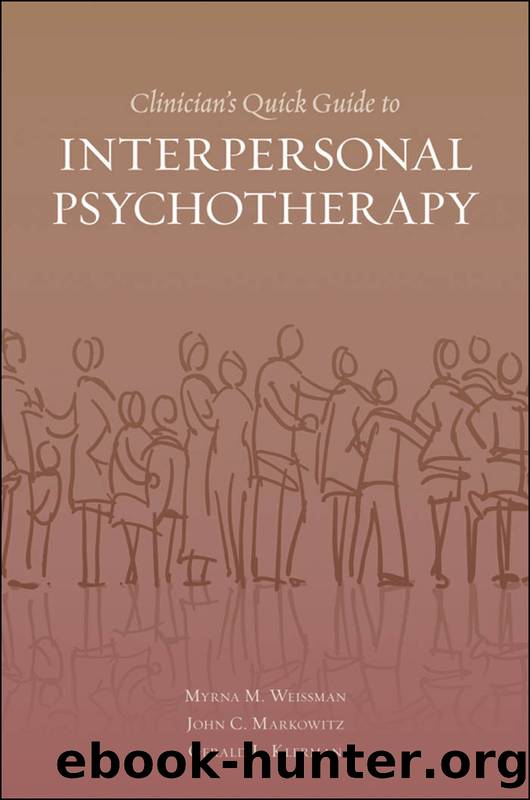Clinician's Quick Guide to Interpersonal Psychotherapy by unknow

Author:unknow
Language: eng
Format: epub
Publisher: Oxford University Press, Incorporated
Published: 2007-08-15T00:00:00+00:00
11
Maintenance Treatment of Depression
IPT was designed as an acute, time-limited treatment. Resolving an episode of major depression using IPT takes 12â16 weeks. It would be nice if the problem ended there, but unfortunately it often does not. Even patients who have remitted from a first episode of major depression face the likelihood of a relapse or recurrence at some point. Patients who have had multiple episodes are almost sure to have more unless given antidepressant prophylaxis (Judd et al., 1998; Judd and Akiskal, 2000).
The termination phase at the end of a successful course of IPT treatment should include discussion of the possibility that depression could recur and that if it does, it is not the patientâs fault but the return of a potentially recurrent illness. Under such circumstances the patient should seek further treatment. If the patient has had a single episode of depression and has few residual symptoms, it may be appropriate to send the patient home with this advice. Although the patient is likely to experience another episode at some point in life, it may never happen or not occur for many years.
If the patient has had multiple prior depressive episodes or has improved in IPT but still reports a high level of residual symptoms, then the patient is at high risk of relapse, and prophylactic interventions should be discussed as part of the termination. Medication has been the most carefully studied intervention and has yielded the most consistently efficacious prophylaxis of relapse of major depression. However, cognitive behavioral therapy (CBT) and IPT have also shown preventive benefits for patients. Thus, maintenance IPT should be considered as an option for continued treatment.
In addition to those with recurrent depression, patients who should be considered for maintenance IPT include women during pregnancy and lactation, for whom medication may not be possible or optimal but who can be maintained with a lower probability of relapse if they receive IPT. Elderly depressed patients who may not tolerate medication, as well as patients who have a history of recurrence but do not wish to take medication, are candidates for maintenance treatment. The evidence for the efficacy of IPT weekly for 6 months as a continuation treatment (or monthly for 3 years of maintenance treatment) is quite strong.
Repeated research trials have demonstrated not only that IPT can help patients to remit from major depression but also that maintenance IPT (IPTM), even at the low dose of one monthly session, can preserve euthymia for patients and forestall the return of depressive symptoms even for patients at very high risk for relapse (Frank et al., 1990; Frank, Kupfer, Wagner, McEachran, & Cornes, 1991; Reynolds, III, Frank, Dew, et al., 1999; Reynolds, III, Frank, Perel, et al., 1999).
Level of Evidence: **** Treatment has been validated by at least two randomized controlled trials demonstrating the superiority of IPT to a control condition. (The exception is a study showing that monthly maintenance IPT was not as efficacious as medication for depressed patients who were older than 70 years of age [Reynolds, III, et al.
Download
This site does not store any files on its server. We only index and link to content provided by other sites. Please contact the content providers to delete copyright contents if any and email us, we'll remove relevant links or contents immediately.
The Art of Thinking Clearly by Rolf Dobelli(8873)
The 5 Love Languages: The Secret to Love That Lasts by Gary Chapman(8532)
Mindhunter: Inside the FBI's Elite Serial Crime Unit by John E. Douglas & Mark Olshaker(7852)
Becoming Supernatural by Dr. Joe Dispenza(7122)
The Road Less Traveled by M. Scott Peck(6650)
Nudge - Improving Decisions about Health, Wealth, and Happiness by Thaler Sunstein(6644)
Enlightenment Now: The Case for Reason, Science, Humanism, and Progress by Steven Pinker(6416)
Win Bigly by Scott Adams(6329)
Mastermind: How to Think Like Sherlock Holmes by Maria Konnikova(6257)
The Way of Zen by Alan W. Watts(5813)
Factfulness: Ten Reasons We're Wrong About the World – and Why Things Are Better Than You Think by Hans Rosling(4033)
The State of Affairs by Esther Perel(3946)
Gerald's Game by Stephen King(3928)
Man's Search for Meaning by Viktor Frankl(3649)
The Confidence Code by Katty Kay(3576)
Thinking in Bets by Annie Duke(3542)
The Worm at the Core by Sheldon Solomon(2929)
Enlightenment Now by Steven Pinker(2925)
Liar's Poker by Michael Lewis(2822)
